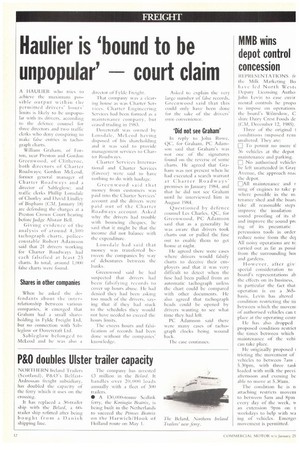Haulier is 'bound to be unpopular' — court claim
Page 12

If you've noticed an error in this article please click here to report it so we can fix it.
A HAULIER who tries to achieve the maxim 1101 possible output within the permitted drivers' hours' limits is likely to be unpopular xvith its drivers, according to the defence counsel for three directors and two traffic clerks who deny conspiring to make false entries in tachograph charts.
William Graham, of [:or_ ton, near Preston and Gordon Greenwood, of Clitheroe, both directors of Charter Roadways; Gordon McLeod, former general manager of Charter Roadways and a director of Sableglow; and traffic clerks Phillip Lonsdale of Chorley and David Lindley of Bispham (CM. January 18) are defending the charges at a Preston Crown Court hearing before Judge Alistair Bell.
Giving evidence of the analysis of around 4,51)11 tachograph charts, policeconstable Robert Adamson said that 21 drivers working For Charter Roadways had each falsified at least 25 charts. In total, around 1,000 false charts were found.
Shares in other companies
When he asked the defendants about the interrelationship between various companies, it emerged that Graham had a small shareholding in Fylde Freight Ltd, but no connection with Sableglow or Hovercraft Ltd.
Sableglow be to McLeod and he was also a director of Fylde Frei:411t.
'Elia company was a clearing house as was Charter Services. Charter Engineering Services had been formed as a maintenance company, but ceased trading in 1983.
Hovercraft was owned by Lonsdale. McLeod having disposed of his shareholding and it Was said to provide management services to Charter Roadways.
Charter Services International and Charter Services (Greece) were said to have nothing to do with haulage.
Greenwood said that money from customers was paid into the Charter Services' account and the drivers were paid out of the Charter Roadways account. Asked why the drivers had trouble with bouncing cheques, he said that it might be that the income did not balance with the expenditure.
Lonsdale had said that money was transferred between the companies by way of debentures between the banks.
Greenwood said he had suspected that drivers had been falsifying records to cover up hours abuse. Ile had denied they had been asking too much of the drivers, saying that if they had stuck to the schedules they would not have needed to exceed the hours limits.
'Hie excess hours and falsification of records had been done without the companies' knowledge.
Asked to explain the very large number of false records, Greenwood said that this could only have been done for the sake of die drivers' own C011 venience.
'Did not see Graham' In reply to John Rowe, Q(:, for Graham, PC Adamson said that Graham's was not One of the signatures found on the reverse of some charts. Ile agreed that Graham was not present when he had executed a Search warrant at Charter Roadways' premises in January 1984, and that he did not see Graham until he interviewed him in August 1984.
Questioned by defence counsel Les Charles, QC, for Greenwood, PC Adamson said that as a generality he was aware that drivers took charts out or pulled the fuse out to enable them to get home at night.
lie agreed there Were Cases where drivers would falsify charts to deceive their employers and that it was very difficult to detect when the fuse had been pulled from an automatic tachograph unless the chart could be compared with other documents. He also agreed that tachograph heads could be opened by drivers wanting to see what time they had left.
PC Adamson said there Were many cases of tachograph clocks being wound back.
The case continues.


























































